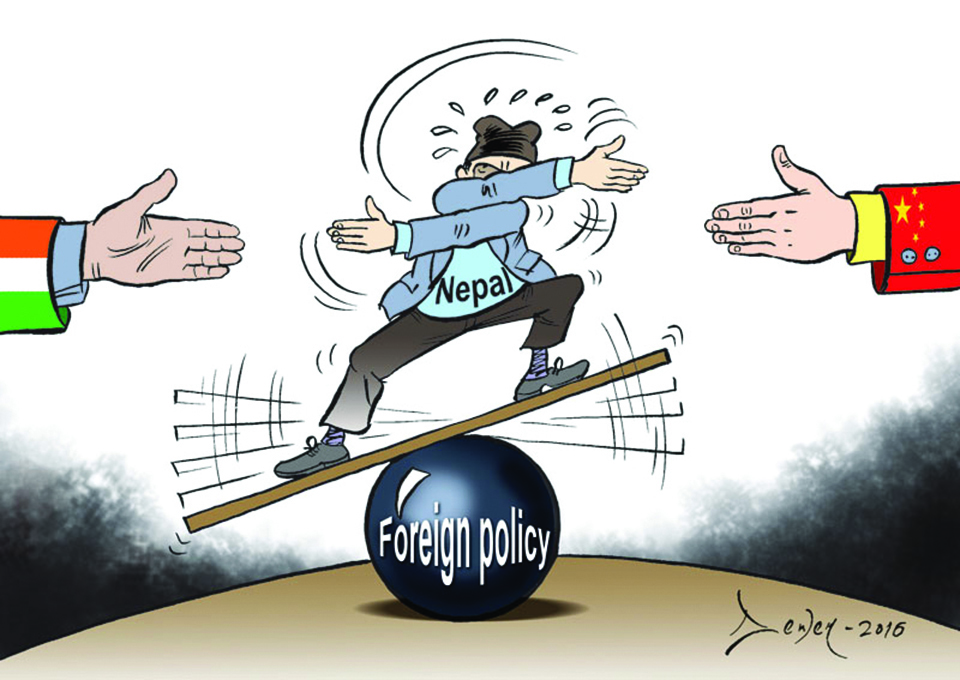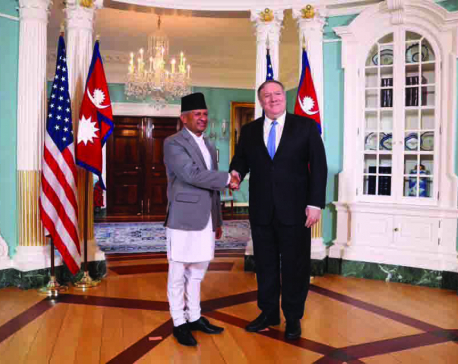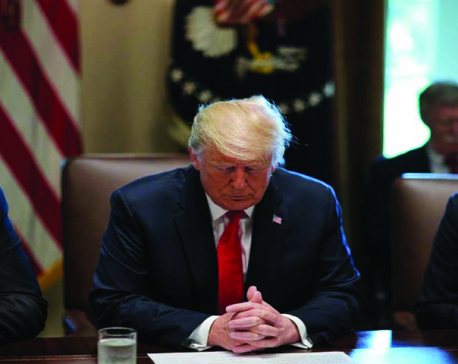
OR


Kamal Dev Bhattarai
The author is editor of www.hakahakionline.com, operated by Nepal Forum of Environmental Journalists (NEFEJ). He writes on foreign policy, media and development issuesnews@myrepublica.com
The government is constitutionally obliged to take measures to recalibrate Nepal’s foreign policy. It should bring detailed vision for this without delay
The constitution of Nepal has clearly charted priorities for country’s foreign policy. Article 51, under Directive Principles, Policies and Responsibilities of the State states that ‘an independent foreign policy would be conducted based on the Charter of the United Nations, non-alignment, principles of Panchsheel, international law and the norms of world peace, taking into consideration the overall interest of the nation, while remaining active in safeguarding the sovereignty, territorial integrity, independence and national interest of Nepal.”
The same Article talks about reviewing treaties concluded in the past, and make new treaties, and agreements based on equality and mutual interest.
The government is obliged to take measures to recalibrate Nepal’s foreign policy. It should thus bring detailed vision on foreign policy without any delay.
Sadly this does not reflect in nine month’s performance of KP Sharma Oli-led government. It has not been able to provide a new impetus to the country’s foreign policy. The visits of prime minister, president and ministers have increased but there has been little or no progress in substance. There is a flawed understanding among the leaders that frequent foreign visits bring fruits in bilateral relation. It does not work that way. We need to have clear objective, purpose and visions which we sorely lack at the moment.
Reactive diplomacy
Nepal’s foreign policy conduct has suffered from lack of long-term thinking and holistic approach. The government has not yet come up with long-term vision on how it wants to develop relation with immediate neighbors and with other big powers. Our diplomacy has often been reactive instead of being proactive. Prime Minister’s official visit to Costa Rica and last minute cancellation of BIMSTEC military drill are the examples which show how Nepal has taken decisions on foreign policy issues reactively, without sufficient discussions and proper homework.
And then there was government’s consent to become the co-host of Asia Pacific Summit hosted by a controversial organization. After criticisms from the opposition, the government had to withdraw the decision.
We are in the process of reviewing past policies and treaties. There must be widespread discussions and consultations of those policies to solicit people’s support. Similarly, parliamentary committees and parliament must be allowed to discuss the foreign policy priorities of the government. We don’t see this happening here. Government is busy reiterating vague and abstract slogan of ‘balanced relation with India and China and taking maximum economic benefits from them.’ But we have never defined what that ‘balanced relation’ actually constitutes.
This is not to say that nothing has happened. There are some improvements on pending projects with India. Bilateral visits have increased. Yet, lack of trust still remains an issue. The Eminent Persons Group (EPG) has prepared its report but it is yet to be submitted to the governments of respective countries.
The communist alliance, which now rules, had promised to come up with a new vision to redefine bilateral relation with India in their election manifesto. Where is that vision? It had told us back then that unequal treaties will be revised or even scrapped. What is the progress ? Yes, EPG’s recommendations may offer solutions (hopefully) but what actually is the government’s position on contentious issues?
As a matter of fact, our relation with China remains in status quo. The only progress made so far is finalization of protocol of Transport and Transit Treaty but several issues related to Belt and Road Initiatives (BRI) remains unsettled. It seems that government is still in dilemma on how to deal with BRI projects. While it seems eager to speed up infrastructure projects under BRI, it seems to fear the “debt trap” too. It shows lack of intensive study on BRI and how Nepal can benefit from it.
The government claims it has given more emphasis on economic diplomacy. But what is the result? During the high level visits, our prime minister and ministers have been urging the international community to invest in Nepal but investment is not coming. Official figure shows Foreign Direct Investment is declining. Recent World Bank report stated that Nepal needs to make doing business easier, which means international community is in wait and watch mode when it comes to investing in Nepal. The government should assure international community about security of their investment. It has not been able to do so. It’s time to seriously analyze why international investors are not willing to invest in Nepal despite the end of political instability.
Dismal picture
Our progress on multilateral engagements remains dismal. The government has called fourth Summit of Bay of Bengal Initiative for Multi-Sectoral Technical and Economic Cooperation (BIMSTEC) a major success but that was a routine summit. As a chair of South Asian Association for Regional Cooperation (SAARC), Nepal should have made serious efforts for holding its summit. Nepal should be holding serious talks with India and other SAARC member states for this. We don’t see this happening.
Prime Minister and Foreign Minister have not given sufficient attention to developing institutional mechanisms in prime minister’s office and foreign ministry to deal with foreign affairs issues. Ministry of Foreign Affairs has not been strengthened nor is there a separated department in PMO to deal with foreign affair issues.
It took nine months for the government to nominate few ambassadors. Exceptions aside, Nepali missions abroad are equipped with competent officials and they send periodic reports to the government. But we have no mechanism in Kathmandu to properly analyze those reports and feed for policy making. Senior officials, ministers and political leaders are not seen meeting to discuss the vital foreign relation issues.
There is dissatisfaction within Ministry about the decisions made by Foreign Minister regarding nomination of envoys. The first priority of foreign minister should be to make MoFA more effective. The diplomatic code of conduct formulated couple of years ago remains largely unimplemented.
Primarily, media plays a vital role in formulation and conduct of foreign policy. But in Nepal media’s role in contributing to shaping the foreign policy has not been properly discussed and assessed. To grab media attention, our ministers and prime minister’s advisors prematurely reveal the information and to some extend make exaggerated claims. Such activities weaken our diplomacy.
Current ad hoc and reactive way of conducting foreign policy must come to an end. There should be clear long-term vision with sound and effective institutional framework to carry forward our foreign relation.
devkamal2004@gmail.com
You May Like This

Looking back at 100
The last two decades have made clear that no post-Cold War US foreign policy consensus exists ... Read More...

Drifts on foreign policy
Diplomacy and development have been conducted in an ad hoc manner based more on sporadic “big dream talks” than a... Read More...

Foreign Policy after midterm election
The Democrats’ best bet is to let Trump take the lead on global affairs, however unsavory ... Read More...




Just In
- Govt receives 1,658 proposals for startup loans; Minimum of 50 points required for eligibility
- Unified Socialist leader Sodari appointed Sudurpaschim CM
- One Nepali dies in UAE flood
- Madhesh Province CM Yadav expands cabinet
- 12-hour OPD service at Damauli Hospital from Thursday
- Lawmaker Dr Sharma provides Rs 2 million to children's hospital
- BFIs' lending to private sector increases by only 4.3 percent to Rs 5.087 trillion in first eight months of current FY
- NEPSE nosedives 19.56 points; daily turnover falls to Rs 2.09 billion















Leave A Comment